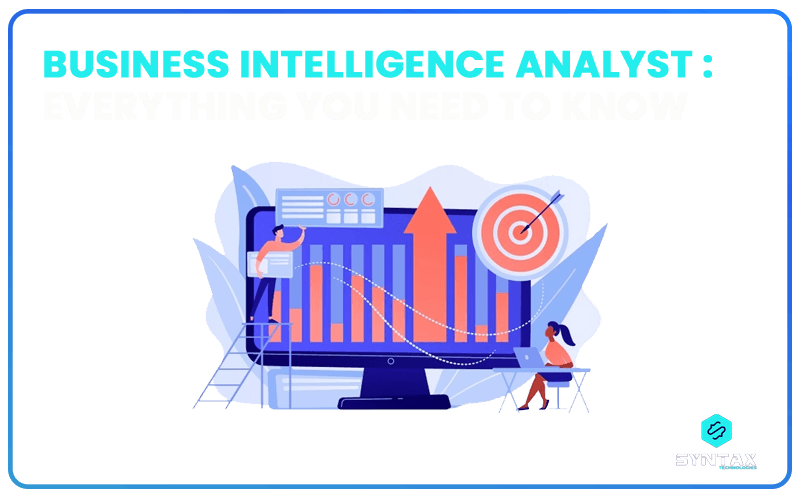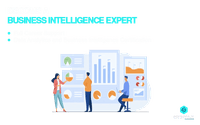Business Intelligence is not just about turning Data into Information, rather Organizations need that Data to Impact how their Business Operates and Responds to the Changing Marketplace. – Gerald Cohen (Co-founder, Information Builders)
The above mentioned quote by Gerald Cohen tries to answer two questions: What is Business Intelligence and the importance of BI. It is evident that Business Intelligence is all about transforming data into valuable information and insights which could drive business decisions.
However, this task of exploiting data is a highly specialized and technical one and is best performed by Business Intelligence professionals. A Business Intelligence Analyst is such a field expert who occupies a coveted position within the tech industry.
In this blog, we will try to answer the question; What does a Business Intelligence Analyst do, by considering the different aspects of the post of a Business Intelligence Analyst.
What is Business Intelligence?
BI can be understood as a combination of Data Analytics and the processes of data collection, data storage and data management. The objective is to assess and transform raw data and information into actionable and meaningful insights through data analysis.
These insights have a positive impact on the different kinds of business decisions of the organization. Business Intelligence covers data tools, data visualization, data mining, infrastructure, data analytics and so on, in order to provide easy and understandable summaries which could help organizations to make decisions which are data-driven.
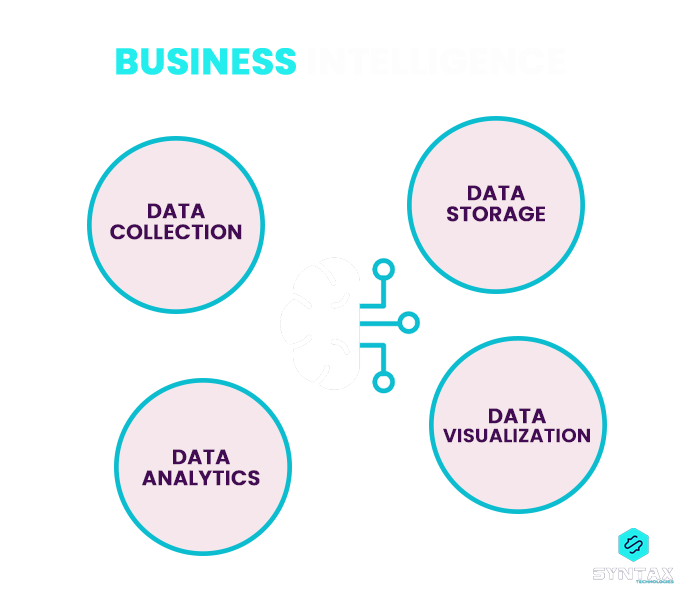
What is a Business Intelligence Analyst?
If BI is the analysis of data collected by an organization; the person who performs the task of analyzing that data is a Business Intelligence Analyst. By way of evaluating data in business processes, BI Analysts are able to provide the executives with precise, valuable and actionable information and insights which helps in taking decisions based on hard facts, instead of gut instincts.
This not only helps in diminishing the probability of errors but also enhances productivity, increases efficiency and provides for better customer experience through business intelligence analysis.
What does a business intelligence analyst do?
Business Intelligence Analyst Jobs happen to be occupied by individuals who are proficient in the usage of Business Intelligence tools and technologies and have knowledge of computer programming languages as well as comprehensive business knowledge.
The role of a business intelligence analyst is not limited to a particular industry as data science is applicable in many different fields. A Business Intelligence Analyst role covers mining data, executing Data Warehouse strategies, presenting Data Visualizations and defining Key Performance Indicators (KPIs).
BI Analyst Career Path
Business Intelligence Analyst positions require the possession of certain technical/hard as well as non-technical/soft skills. As such, the position of Business Intelligence Analysts involves the need to have a background by which one is able to strike a balance between business and IT.
This implies that a Business Intelligence Career Path can be seen to be originating from a bachelor’s degree in business mathematics, computer science, statistics, accounting, economics, management or related field.
This might suffice for entry level jobs; however, for the purpose of advancement in one’s career, a master’s in Business Analytics or a master’s in business administration (MBA), in certain cases, might pave the way for future growth.
How to become a Business Intelligence Analyst: Acquiring a Professional Certificate
Professional certificates can go a long way in giving you the necessary boost in your career. Online Business Analytics courses and bootcamps can provide you with good opportunities for cultivation of specific skills pertaining to the Business Intelligence domain.
This might relate to knowledge of Data Analytics Techniques as well as a hands-on experience in the usage of BI tools. Additionally, you can aim to become a Certified Business Intelligence Professional (CBIP) if you have the requisite years of experience in data modeling, computer information systems, or a related domain.
We, at Syntax Technologies, too offer you such an opportunity to acquire the necessary skills to be a Data expert and a Business Intelligence Analyst.
Business Intelligence Analyst Job Description
In this section of the blog, we will try to look at what a BI Analyst does in terms of his roles and responsibilities.
- Data Acquisition: Business Intelligence Analysts are required to develop strategies for collecting, processing and analyzing data. They also play a role in deploying data to data warehouse.
- Data Interpretation: A BI Analyst plays a crucial role in deriving valuable insights from data by way of interpreting it. These patterns, correlations and trends, so identified, help in preparing strategies for business improvement.
- Data Presentation: A BI Analyst is responsible for sharing data analytics findings with clients, stakeholders and other teams.
- They are responsible for comprehending the existing state of business and acting as the vertical bridge by way of transmitting high value information to decision makers.
- Business Intelligence Analysts are expected to oversee the process of Big Data handling and even have a say in framing intelligence gathering priorities in future.
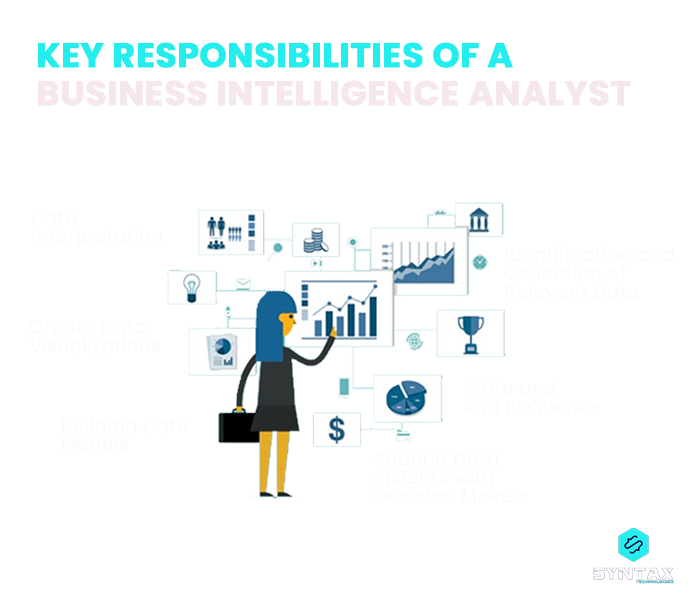
BI Analyst Skills
A Business Intelligence Analyst is expected to possess the right balance of analytical, technical/hard as well as non-technical/soft skills. In this section, we will look at some of the critical BI Analyst Skills which are important in terms of helping these individuals fulfil their professional responsibilities.
Knowledge of Coding and Programming Languages
In the capacity of a BI Analyst, you might be required to build mechanisms which could help in the analysis of data. Consequently, an understanding of coding languages like Java, Python, R and others, become important.
Knowledge of Database Tools
A Business Intelligence Analyst Job Description entails continuous work with data. This implies that it is important for these individuals to be proficient in the handling and management of data. This requires knowledge of tools such as SQL and Excel.
Knowledge of Data Visualization services
It is not just enough to collect and analyze data. The information would make no sense unless they are presented in understandable forms to the decision makers. Thus, Business Intelligence Analysts need to have an understanding of such services as Tableau, Power BI and others which help in producing visually appealing Data Visualizations.
Excellent Communication and Problem-Solving Skills
BI Analyst Jobs are often considered to be bridging positions which connect different parts of the organizations. These individuals are responsible for sharing findings with those responsible for taking decisions. This makes it important for them to possess excellent verbal and written communication skills.
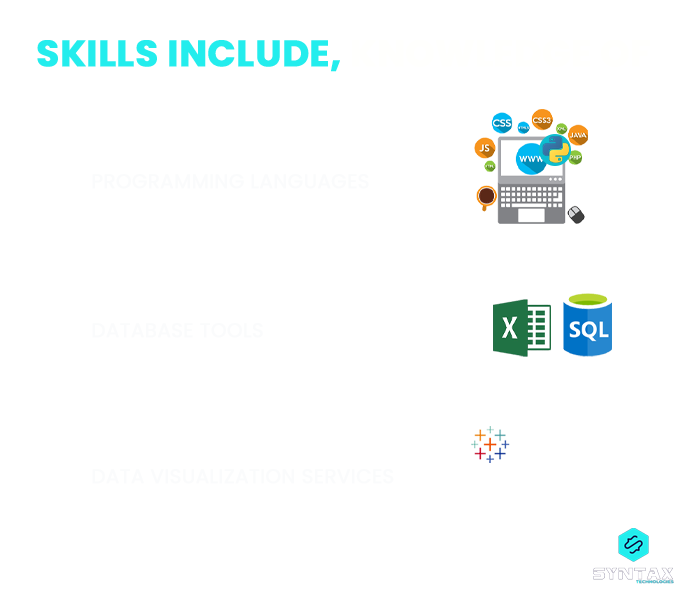
Business Intelligence Analyst Certification
As far as certification for Business Intelligence Analysts is concerned; the Certified Business Intelligence Professional (CBIP) is currently one of the main professional certifications available. It is provided by Transforming Data with Intelligence (TDWI) which is responsible for certifying individuals as BI Practitioners if they happen to score above 50% on all the three exams offered by the institute.
This involves possession of comprehensive knowledge of BI tools, concepts and techniques. If an individual happens to score at 70% or higher, they are certified at the Mastery Level.
Alongside, you can also look for acquiring professional knowledge and certifications in specific BI tools like Tableau, Power BI, Hadoop, SAS or programming languages like Python, R and others.
This can act as a major boost especially when you are aspiring for a Business Intelligence Analyst Job Description which includes a specific framework or tool as its requirement.
We, at Syntax Technologies, provide you with an amazing opportunity to take up our Data Analytics and Business Intelligence Course, upon completion of which, you will have sufficient knowledge to be able to take the following certificates:
Analyzing and Visualizing Data with Microsoft PowerBI
Tableau Desktop Certified Professional

Business Intelligence Analyst Salary
According to latest statistics, the average Salary of a Business Intelligence Analyst in the United States happens to be around $84,635/year. The average annual Business Intelligence Analyst Salary in the United Kingdom happens to be in the range of 35,000-45,000.
Side by side, the Business Intelligence Analyst’s Salary can be compared to similar roles wherein Business Intelligence Consultant commands an annual average of $91,517; $112,049 for BI Architect and $116,684 for a Business Intelligence Manager.
Conclusion
It is quite evident that the significance of the position of a Business Intelligence Analyst is all set to increase by leaps and bounds in the near future. As per the report by the United States Bureau of Labor Statistics, the demand for Business Intelligence Analyst Jobs is predicted to grow at a rate of 21% between 2014 and 2024.
Moreover, there is a talent gap with the supply line of Business Intelligence Analysts, far from being saturated. Thus, the time is ripe for you to take advantage of the lucrative opportunities which abound in this career.
This is not simply in terms of a handsome Business Intelligence Analyst Salary, but also in terms of the growth opportunities which would be readily available to you as a Business Intelligence Analyst.
